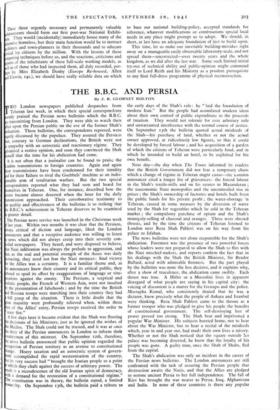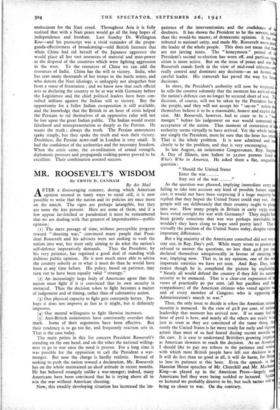THE B.B.C. AND PERSIA
By J. R. GLORNEY BOLTON
11WO London newspapers published despatches from I Teheran last week, in which their special correspondents Family praised the Persian news bulletins which the B.B.C. Ire transmitting from London. They were able to watch their flea upon the Persian public on the eve of the former Shah's bdieation. These bulletins, the correspondents reported, were agerly discussed by the populace. They assured the Persians hat, contrary to German declarations, the British were not n sympathy with an autocratic and reactionary regime. They pivanised a restive opinion, and soon they convinced the Shah imself that the time for his abdication had come.
It is not often that a journalist can be found to praise the .ondon transmissions to foreign countries. Again and again hese transmissions have been condemned for their timidity and for their failure to rival the Goebbels' machine as an indis- pensable arm of totalitarian warfare. But the two special orrespondents reported what they had seen and heard for hemselves in Teheran. One, for instance, described how the nets became almost deserted when the hour for the daily ansmission approached. Their corroborative testimony to lie quality and effectiveness of the bulletins is so striking that he B.B.C.'s achievement in Teheran deserves to be examined n greater detail.
The Persian news service was launched in the Christmas week if last year. Within two months it was clear that the Persians, ways critical of diction and language, liked the London nnouncers and that a receptive audience was willing to listen o news which did not always creep into their severely con- rolled newspapers. They heard, and were disposed to believe, hat Nazi infiltration was always the prelude to aggression, and at, as the real and potential strength of the Awes was daily creasing, they need not fear the Nazi menaces: final victory or the Allies was a certainty. It is a familiar theme and, as he announcers knew their country and its critical public, they efused to spoil its effect by exaggerations of language or vitu- nations against the enemy. The Persians, a sceptical and ealistic people, the French of Western Asia, were not insulted y the presentation-of falsehoods ; and by the time the British and Russian troops were marching into their country they had I full grasp of the situation. There is little doubt that the ;neat majority were profoundly relieved when, within three lays of the Allies' entry, Persian troops received the order to cease fire."
A few days later it became evident that the Shah was flouting he decisions of his Ministers, just as he ignored the wishes of he Majliss. The Shah could not be trusted, and it was at once he duty of the Persian announcers in London to inform their muntrymen of this mistrust. On September 12th, therefore, he news bulletin announced that public opinion regarded the xcupation of Persian territory as an avenue to constitutional 'huge. Heavy taxation and an autocratic system of govern- Sent accomplished the rapid westernisation of the country, )llt its very success had " brought the Iranian people to a point t which they chafe against the success of arbitrary power. The esult is a recrudescence of the old Iranian spirit of democracy, Pith a demand for the restoration of a constitutional regime." Ille Constitution was in theory, the bulletin stated, a limited monarchy. On September 13th, the bulletin paid a tribute to the early days of the Shah's rule : he " laid the foundation of modern Iran." But the people had assimilated modern ideas about their own control of public expenditure as the proceeds of taxation. They would not tolerate for ever arbitrary rule and unwarranted interference with the normal course of justice. On September 13th the bulletin quoted actual misdeeds of the Shah—his purchase of land, whether or not the actual owner approved, at ridiculously low figures, so that it could be developed by forced labour ; and his acquisition of a garden of which the citizens of Teheran were particularly fond, and in which he intended to build an hotel, to be exploited for his own benefit.
Next day—the day when The Times informed its readers that the British Government did not fear a temporary chaos which a change of regime in Teheran might cause—the London announcer cited a longer list of grievances: the forced labour in the Shah's textile-mills and on his estates in Mazanderan ; the uneconomic State monopolies and the uncontrolled rise in prices ; the Shah's ownership of factories and hotels built from the public funds for his private profit ; the water-shortage 'n Teheran, caused in some measure by the diversion of water used by the Shah for vegetables which he sold in the Teheran market ; the compulsory purchase of opium and the Shah's monopoly-selling of charcoal and oranges. These were shrewd thrusts, and by the time the citizens of Teheran listened to London next Reza Shah Pahlevi was on his way from his palace to Isfahan.
The news bulletins were not alone responsible for the Shah's abdication. Foremost was the presence of two powerful forces whose leaders were not prepared to allow the Shah to flirt with the Nazi mischief-makers, and reports confirm the fact that in his dealings with the Shah the British Minister, Sir Reader Bullard, acted with admirable firmness. But the part played by the bulletins was none the less decisive, and it explains why, after a show of truculence, the abdication came swiftly. Each thrust was true. A Hitler or a Mussolini lives in apparent disregard of what people are saying in his capital city: the voicing of discontent is a matter for the Gestapo and the police. Mustapha Kemal, who consistently denied that he was a dictator, knew precisely what the people of Ankara and Istanbul were thinking. Reza Shah Pahlevi came to the throne as a former trooper who was pledged to give his people the benefits of constitutional government. The self-destroying lust of power proved too strong. The Shah beat and imprisoned a popular War Minister. His subjects hurried home, not to hear about the War Minister, but to hear a recital of the misdeeds which, year in and year out, had made their own lives a misery. Whether or not the Shah noticed that the square outside his palace was becoming deserted, he knew that the loyalty of his people was gone. A guilty man, once the Shah of Shahs, fled from the capital.
The Shah's abdication was only an incident in the career of the Persian news bulletins. The London announcers are still confronted with the task of assuring the Persian people that destruction awaits the Nazis, and that the Allies are pledged to restore ancient Persia to her full independence. The fall of Kiev has brought the war nearer to Persia, Iraq, Afghanistan and India. In none of these countries is there any popular enthusiasm for the Nazi creed. Throughout Asia it is fully realised that with a Nazi peace would go all the long hopes of independence and freedom. Last Sunday Dr. Wellington Koo—and his postscript was a vivid reminder of the propa- ganda-effectiveness of broadcasting—told British listeners that when China had _rid herself of the Japanese aggressor she would place all her vast resources of material and man-power at the disposal of the countries which were fighting aggression in the west. To the resources of China we can add the resources of India. China has the will to victory. India, who has sent many thousands of her troops to the battle zones, and who detests the Nazi ideology, is unhappily not altogether free from a sense of frustration ; and we know now that such official acts as declaring the country to be at war with Germany before the Legislature and the chief political leaders have been con- sulted militate against the Indian will to victory. But the opportunity for a fuller Indian co-operation is still available, and the knowledge that the British in an hour of crisis helped the Persians to rid themselves of an oppressive ruler will not be lost upon the great Indian public. The Indian would resent falsehood and misrepresentation as deeply as the Persian. He wants the truth ; always the truth. The • Persian announcers spoke simply, but they spoke the truth and won their victory. Doubtless, the Persian news-staff in London is very small. It had the confidence of the authorities and the necessary freedom. When the crisis came, the co-ordination of armed strength, diplomatic pressure and propaganda striking-power proved to be excellent. Their combination assured success.



























 Previous page
Previous page